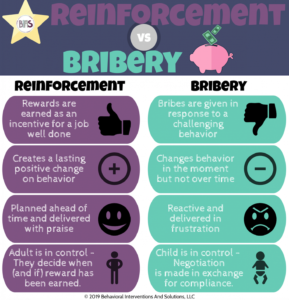Reinforcement and bribery are one of the most misunderstood topics, so what is the difference between reinforcement and bribery and why does it matter?
The difference between reinforcement and bribery greatly depends on the timing. Reinforcement needs to be set up ahead of time, before any behaviors occur, while bribery occurs in the middle of challenging behaviors.
Let’s take a look at a typical bribery scenario:
You are at the store, after about 10 minutes your child starts screaming, yelling and trying to get out of the cart…..throwing a full on tantrum as you are trying to get into the check out line. You say, “Fine! You can have this candy bar! Now be quiet so I can pay for our items!” You child immediately sits down and begins eating the candy bar and you are able to check out.
Did the bribing work? Yes, in the short term bribing does work, but it’s important to consider the long term pattern that you are setting up for the child. Let’s look at the end result of bribery:
What did the child get for throwing a tantrum? A Candy Bar!
What did the child get for being good? Nothing.
What has happened is your child has learned that behaving badly is being rewarded and behaving good is not.
As they get older and bigger, that behavior is going to get worse and when it gets to the point of them asking for something outrageous (candy bar is no longer enough, now they want a video game) they will likely be too big to just remove them from the store. If you are already using bribery, stop immediately, but don’t worry, there is an alternative….

Reinforcement
re·in·force·ment /rēinˈfôrsmənt/
noun: the process of encouraging or establishing a belief or pattern of behavior, especially by encouragement or reward.
Let’s try that same scenario again using Reinforcement:
Before you get to the store, you remind your child of what the expectation is (i.e. “your job at the store is to stay in the cart with a quiet mouth and help me find the items I’m looking for”), and then you remind them what they are working for, “If you stay in the cart with a quiet mouth and help me, when we are done we can stop at the park to play”. Your child stays in the cart and helps you find items, when they start to get wiggly, you remind them of their job and if they do their job they get to go to the park after. Your child sits back down, you make it out the checkout aisle without incident and you stop by the park on the way home.

Did the reinforcement work? Yes, and chances are the child will make the connection that they get rewarded for good behavior, and not for acting out, which will increase the likelihood of them being good at the store again! Win!!
So next time you are mentally preparing for that activity with your child where you know they will have a behavior, think about how you can set up a Reinforcement System ahead of time and save yourself the embarrassment, stress and drama that leads us down the road to resulting to Bribery.
